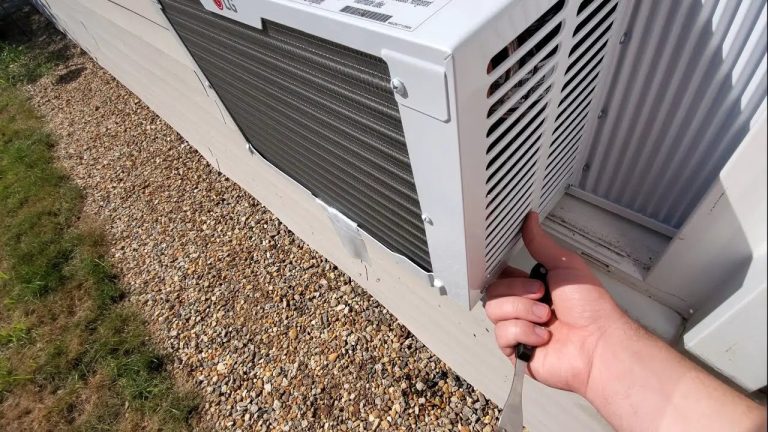How To Make Your Air Conditioner Quieter: 5 Easy Steps
Here are five easy steps to make your air conditioner quieter: 1. Regular Maintenance: Keep your AC unit clean and well-maintained to reduce noise caused by debris or loose parts. 2. Insulate the Unit: Use soundproofing materials or blankets to dampen the noise produced by the AC unit. 3. Install Anti-Vibration Pads: Place anti-vibration pads under the unit to minimize vibrations and reduce noise transmission. 4. Use Sound Barriers: Create barriers around the AC unit using soundproof curtains, panels, or foam insulation to block noise. 5. Upgrade to a Quieter Model: Consider replacing your old unit with a newer, more advanced air conditioner that is specifically designed for quieter operation. Implementing these steps will help create a more peaceful and relaxing environment in your home, reducing both noise and disturbance caused by the air conditioner.
With the scorching heat of summer upon us, there’s nothing quite as refreshing as stepping into a cool, air-conditioned home. However, as much as we relish the cool relief, the constant whirring and buzzing of the air conditioner can quickly become an unwelcome distraction.
Fortunately, there’s a simple solution: making your air conditioner quieter. Imagine being able to enjoy the comfort of a cool home without the constant background noise.
No more disturbances during sleep or work, no more reduced comfort, and no more annoyance caused by the noise. By following just five easy steps, you can significantly reduce the noise level of your air conditioner, creating a more peaceful and relaxing environment for you and your family. For homeowners or renters who own or use air conditioners, this information is invaluable.
Whether you have just purchased a new unit or have been dealing with the noise for years, knowing how to make your air conditioner quieter can greatly enhance your quality of life. This knowledge not only provides a more soothing living space but also contributes to reduced energy consumption, saving you money on your utility bills. In this article, we will guide you through the process of making your air conditioner quieter, providing you with practical and effective solutions that you can implement right away.
Understanding the Noise from Your Air Conditioner
Before we dive into the strategies for making your air conditioner quieter, it’s essential to understand the source of the noise. By identifying the specific components and mechanisms responsible for the noise, you’ll be better equipped to find effective solutions.
The most common sources of noise in an air conditioner include the compressor, fan motor, condenser unit, and the air handler. Each of these components plays a crucial role in cooling your home, but they can also contribute to the noise.
How To Make Your Air Conditioner Quieter
Step 1: Regular Maintenance
The first and most important step in reducing the noise from your air conditioner is to ensure regular maintenance. Over time, the parts of your air conditioner can become loose, dirty, or worn out, leading to increased noise levels.
Start by cleaning or replacing the air filters. Clogged or dirty filters restrict airflow, causing the system to work harder and create more noise. Cleaning or replacing the filters not only reduces noise but also improves the efficiency of your air conditioner.
Next, check the condenser unit located outside. Remove any debris, leaves, or obstructions that may be blocking the unit. A clean and unobstructed condenser unit allows for better airflow, reducing noise and enhancing performance.
Finally, schedule annual maintenance with a professional HVAC technician. They will inspect and tune up your entire air conditioning system, tightening any loose parts, lubricating the moving components, and ensuring optimal performance. Regular maintenance not only reduces noise but also extends the lifespan of your air conditioner.
Step 2: Soundproofing
If you’ve taken care of the maintenance but the noise persists, it’s time to consider soundproofing your air conditioner. Soundproofing not only reduces the noise that escapes from the unit but also prevents outside noise from entering your home.
Start by insulating the walls and ceiling surrounding the air conditioner unit. Use specialized soundproofing materials such as mass-loaded vinyl, acoustic foam panels, or soundproof curtains to absorb and dampen the noise vibrations.
Additionally, you can create an enclosure or a barrier around the air conditioner unit to further minimize the noise. This enclosure can be made from wood or sound-absorbing materials and should be designed to allow for proper airflow while reducing the noise transmission.
Step 3: Upgrade to a Quieter Unit
If your air conditioner is old and outdated, it may be inherently noisy due to the aging components. In such cases, upgrading to a newer and quieter unit can be a worthwhile investment.
Look for air conditioners that have a high Seasonal Energy Efficiency Ratio (SEER) rating. These units are not only more energy efficient but also designed to operate quietly. Manufacturers often provide noise ratings in decibels (dB), so look for units with lower dB ratings for quieter operation.
Step 4: Use Sound Dampening Accessories
If replacing your air conditioner unit is not feasible, you can still reduce the noise by using sound dampening accessories.
Consider installing an acoustic blanket or a soundproofing mat around the compressor or the outdoor unit. These accessories are designed to absorb noise and vibrations, significantly reducing the overall noise level.
You can also use a soundproofing barrier or mat around the air handler or the indoor unit. These barriers prevent noise from escaping into your living space, creating a more peaceful environment.
Step 5: Optimize Airflow
Inadequate airflow can contribute to increased noise levels from your air conditioner. By optimizing airflow, you can not only reduce noise but also improve the overall performance of your system.
Ensure that all the supply vents and return grilles in your home are clean and unobstructed. Blocked vents and grilles can cause air turbulence, leading to increased noise. Additionally, make sure that the air registers are fully open and not partially closed, as this can create unnecessary noise.
If you have a central air conditioning system, consider using zoning to regulate airflow. By controlling which areas receive cooling, you can minimize noise by reducing the load on the system and allowing it to operate more quietly.
Homemade air conditioner DIY – Awesome Air Cooler! – EASY Instructions – can be solar powered!
Frequently Asked Questions (FAQ)
How can I make my air conditioner quieter?
Can I reduce the noise of my air conditioner by adjusting the fan speed?
Are there any specific air conditioner models that are known for being quieter?
Is it possible to soundproof the walls or windows to reduce the noise from my air conditioner?
Should I consider hiring a professional to make my air conditioner quieter?
Final Words: How to Make Your Air Conditioner Quieter
In conclusion, if you want to make your air conditioner quieter, there are several steps you can take. First, understanding the source of the noise is crucial, as it allows you to target specific components for noise reduction.
Regular maintenance is essential, including cleaning or replacing air filters and ensuring the condenser unit is free of debris. Scheduling annual maintenance with a professional technician is also recommended.
If the noise persists, soundproofing your air conditioner can be an effective solution. This can involve insulating the surrounding walls and ceiling, creating an enclosure or barrier, and using soundproofing materials to absorb the noise vibrations. Upgrading to a newer and quieter unit is another option, especially if your current air conditioner is old and outdated.
Look for units with high SEER ratings and low dB ratings for quieter operation. Using sound-dampening accessories around the compressor and air handler can also help reduce noise levels. Acoustic blankets or soundproofing mats can absorb noise and vibrations, creating a more peaceful environment.






